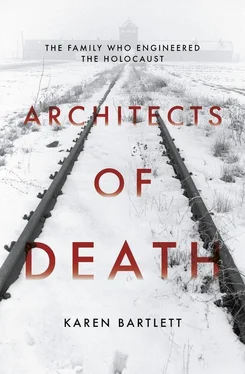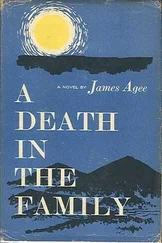By 1956, the Topf company had given up selling cremation ovens, and was focusing on making municipal incinerators, while Ernst Wolfgang employed desperate measures to stave off insolvency and apply for loans. These efforts proved to be nothing more than sticking plasters: two years later, the Topf family was registered as living on state welfare, with Ernst Wolfgang marked down as unfit for work on health grounds. The new Topf company was economically dormant from 1959 until its final dissolution in March 1963.
These economic difficulties faced by a small, failing company, which Ernst Wolfgang Topf likened to ‘the life of a tiny creature’ [144] Ibid., p. 335. AS footnote 206: Ernst Wolfgang Topf to the Wiesbaden municipal authorities, 14 March 1952, ThHStAW, Collection Jean-Claude Pressac Nr. 30, sheet 26.
were severe, but they were just a small fraction of the problems Topf was facing. However grandiose his plans, Topf was constantly forced to respond to damaging accusations aired in books and the media, and his denials appeared to do nothing to stem the tide.
Ernst Wolfgang had first compiled a long company and family history in 1950, in a document which made no mention of dealings with the SS or concentration camp ovens. Annegret Schüle notes that Ernst Wolfgang glosses over his brother’s suicide, almost as if it was a family tradition, stating that ‘on 31 May 1945 Ludwig Topf chose to end his life – as his father had done in 1914’. Ernst Wolfgang then adds that both brothers were in grave danger during the war as ‘passionate enemies of Hitlerdom’. [145] Ibid., p. 331. AS footnote 195: The text has survived without cover sheet or covering letter. It is in two parts: A) Report on J. A. Topf & Söhne, (sheets 1–8) and B) Grounds for the request (sheets 9–10). ThHStAW, Collection Jean-Claude Pressac Nr. 30, sheets 41–57, here sheet 50. The request in question is not clear from the text; it only shows that it was about the development of Topf machine manufacturing, i.e. production of installations for the food industry.
By the mid-1950s, with the denazification tribunal and the criminal case behind him, Topf might have been lulled into a false sense of his security; he may have allowed himself to believe that his past actions were well and truly buried. But in 1957, just as Ernst Wolfgang’s financial woes are at their worst, former Dachau inmate and journalist Reimund Schnabel published a book called Macht ohne Moral ( Power without Morals ), which printed documents linking Topf and Sons directly to the SS and the Holocaust. Schnabel had spent time in Dachau for opposing the Nazi euthanasia programme and had written the book to drum up opposition to a plan to allow former Waffen-SS officers, up to the rank of lieutenant colonel, to join the West German army. The book contained photos of piles of bodies of the victims and the ovens themselves, a letter from Topf and Sons to the SS construction management at Mauthausen concerning the incineration capacity of the double-muffle oven, and a letter to Auschwitz from 1 April 1943 quoting a price for building a giant ring cremation oven.
Topf and his wife Erika immediately understood the book would have a ‘devastating impact on anybody who picked it up’, and drafted a 21-page typed response to the main allegations levelled against Topf and Sons. As the archive files show, they took pains to revise and edit the draft several times to ensure that their justifications were exactly right.
Topf began by questioning whether the letters in the book were genuine, and then criticised their inclusion ‘as though this had formed part of the horrendous crimes’. The Topf company carried out its business in ‘exemplary fashion’, Ernst Wolfgang continued, and had always provided technology ‘for the best possible attainment of the greatest possible reverence, as required by the laws relating to cremation’.
Topf continues with what are now familiar justifications for the company’s actions, before claiming that Topf and Sons was a well-known protector of Jews, and the Topf brothers represented ‘a family with the qualities of humanity, especially chosen to protect its persecuted Jewish fellow citizens and colleagues to the very best of its ability, and that we demonstrably did, to the point of self-sacrifice, right up to the end of the war’.
In what he knew was an outright lie, Topf claims that no ‘service personnel from the SS or from any concentration camp were ever received or seen’ in the company, and there had never been ‘any meeting with the SS… in Berlin or anywhere else’. He then goes to great pains to prove that neither of the Topf brothers were Nazis, and that they hadn’t benefited from the Third Reich:
Between 1933 and 1945, we did not take on a single new member of staff with good ‘party connections’, nor did we recruit any such staff from operations. Throughout the twelve Hitler years, we carried out all our customer commissions but did not sympathise in any way whatsoever with either the NSDAP or its affiliated organisations, economic enterprises or functionaries. We deliberately assigned a non-party member to deal with all agencies. We consciously swam against the tide, and consequently encountered serious difficulties with all authorities and party agencies.
We also strictly adhered to our policy relating to treatment of staff, i.e. all staff, whether German or foreign nationals, were treated with equal decency, without any discrimination on the basis of religion, race or language. We also consciously avoided either recruiting, transferring or promoting active party members or other pro-Nazi elements. We rigorously adhered to this principle, even though it put us at a disadvantage when it came to the assignment of white- and blue-collar workers by the Labour Office and State Labour Office. As a consequence of this, our company became a meeting place for opponents of the Hitler system. Of the approximately thirty people we made departmental managers, only three to five were nominal party members.
The ‘political unreliability’ of the Topf brothers can be demonstrated by the fact that neither brother received a war service medal, something handed to many other business owners in Erfurt. In addition, the ‘foreign nationals’ (slave labourers) left the company at the end of the war in an orderly and friendly fashion:
No plundering or destruction of any kind in their camp, the administration block or workshops. No red flag raised. No fighting with Germans… Groups marched off in orderly fashion over a number of days, having first taken their leave of us through spokesmen. Many individual groups of Russian, French and Italian backgrounds thanked us with handshakes.
It is in this document that Ernst Wolfgang Topf refers to the respectable and honourable heads of department who worked for Topf and Sons, and specifically calls Fritz Sander a ‘man of almost excessive integrity’. A succession of investigations had proven that ‘no one in our company had been guilty of anything at all, either morally or in practice’. Challenging the very title of Schnabel’s book, Topf stated that he could ‘describe [his] company and the entirety of its conduct, throughout the twelve years of the Hitler regime, with the phrase: ‘Morality without Power’. [146] E. W. Topf defence to Power without Morals, 1958, Landesarchiv Thüringen - Hauptstaatsarchiv Weimar.
Yet none of this lengthy justification did Ernst Wolfgang any good. When Schnabel’s book was published, in 1957, Topf was already under investigation for promissory note fraud (a crime that involves two or more people sending each other promissory notes as a means of proving that a business is solvent, when there are no actual deals to underpin them). The publication of Macht ohne Moral was the final nail in the coffin for the new Topf company. A loan that had been previously agreed on from the burden sharing office was abruptly turned down. Commerz-und Credit Bank and Deutsche Bank followed suit by refusing to administer a state loan.
Читать дальше












